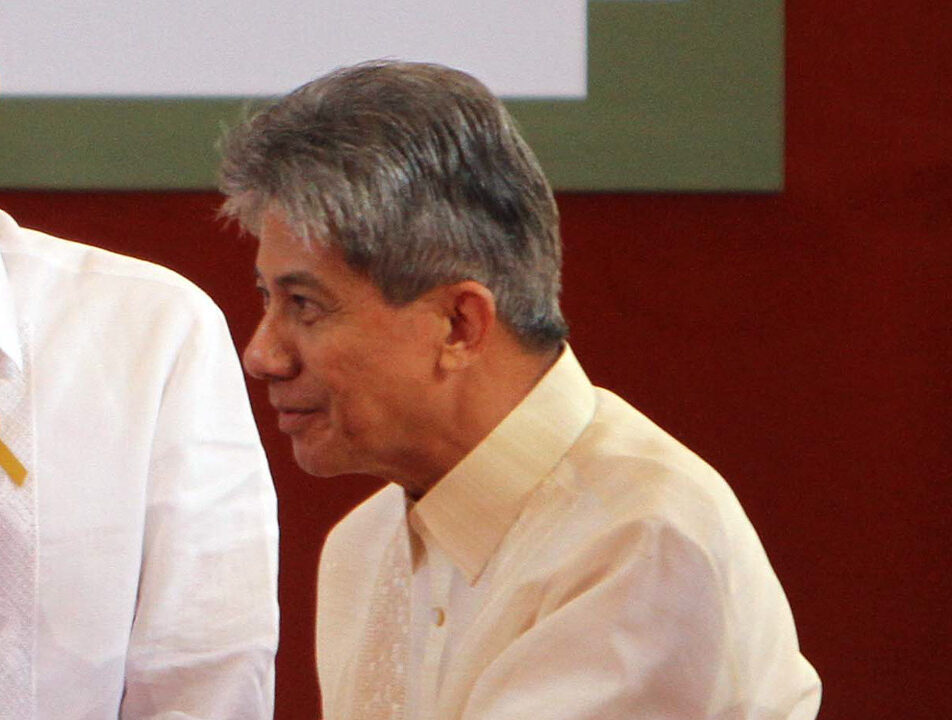
Daniel Lacson Jr. —Lyn Rillon/Inquirer file photo
BACOLOD CITY, NEGROS OCCIDENTAL, Philippines — Former Negros Occidental provincial governor, businessman and civic leader Daniel Lacson Jr., died on Friday night at the age of 77.
As local government executive, Lacson was largely credited with leading the sugar-dependent province out of a bitter economic crisis made starker by famine conditions in the 1980s.
Lacson succumbed to a brain tumor on the night of Sept. 6, surrounded by family members at his residence. He is survived by his wife, Tima Sarabia Lacson, and their children RJ, Patrick, Carla, Teepee and Ria.
READ: The real cost of malnutrition
“We just lost a true public servant of Negros. His life is worth emulating by younger generations,” Bacolod Mayor Alfredo Abelardo Benitez said on Facebook as other tributes poured in on Saturday.
Incumbent Gov. Eugenio Jose Lacson said of his uncle’s passing: “The province of Negros Occidental has lost a brilliant and well-loved leader. His committed and impassioned dedication to service will remain an inspiration to everyone.”
In a statement, Iloilo City Mayor Jerry Treñas said “[Lacson’s] dedication to the people of Negros Occidental and his unwavering commitment to public service have left a profound impact on our community.”
Picked by Cory post-Edsa
Lacson was 39 and a vocal business and civic leader in the province when then President Cory Aquino appointed him governor on April 5, 1986, about two months after the Edsa People Power Revolution that toppled the Marcos dictatorship.
He was reluctant at first to take the job but went on to complete a term till the end of 1987 and be elected for a second term that lasted till 1992.
Lacson did not seek a third term and opted to return to the private sector as president of shipping giant Negros Navigation.
But he was again called to government service when President Fidel Ramos appointed him chair of the Presidential Council for Countryside Development and later chair of the Philippine National Bank.
When Cory’s son, Benigno Aquino III, became President, he also tapped Lacson, this time naming him chair of the Government Service Insurance System in 2010.
‘Visionary’
Former Negros Occidental Gov. Rafael Coscolluela, who served as Lacson’s vice governor, remembers the man as a “visionary” who brought the province out of the crisis years that marked the twilight of the first Marcos administration. The famine that followed the collapse of the province’s sugar industry drew international attention to the plight of starving, emaciated children in the province.
Coscolluela said Lacson was responsible for bringing Negros Occidental back on its feet as he led its recovery and rehabilitation under the slogan “Hope Shines in Negros.”
Lacson began by launching a massive feeding program with the help of United Nations International Children’s Emergency Fund, making potable water accessible and finding other work opportunities for the sugar plantation workers.
He drew up policies to diversify the local economy and end its overdependence on the sugar industry.
60-30-10
It included the so-called 60-30-10 land-use program that limited sugar production to 60 percent of farmlands while allotting 30 percent for other cash crops. The last 10 percent was for families of sugar farmers encouraged to grow their own food.
There was initial resistance to the land-use scheme, but Lacson ultimately prevailed upon his constituents to adopt it and his other economic plans.
Among them was the setup of the Association of Negros Producers (ANP) that found members among the housewives of sugar farmers and produced handmade, export-quality items, from food, garments and fashion accessories to furniture and home decor. The ANP remains active in the foreign market and local trade fairs to this day.
Taiwan as model
Lacson also introduced the Grameen Bank microfinance concept with the help of its very exponent, Bangladeshi banker and future Nobel laureate Muhammad Yunus.
This led to the establishment of the Negros Women for Tomorrow, which has provided funds for small businesses set up by women in poor communities.
He sought to transform the provincial economy, using Taiwan as a model, and drafted a 15-year master plan for the goal.
As a member of the Ramos Cabinet, he pushed for the creation of the Negros Island Region.